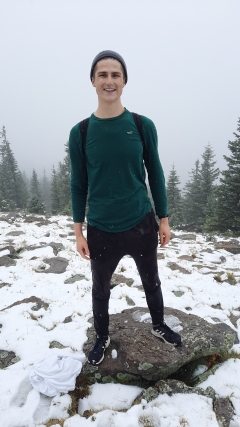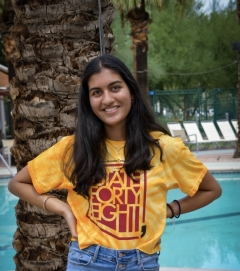Brain, mind and body foci of ASU Health Neuroscience course
YiYuan Tang’s Health Neuroscience course often begins with a few minutes of quiet and a calming mindfulness practice to help students settle down and focus.
Tang, a professor in Arizona State University's College of Health Solutions, said mindfulness is an important component in his teaching.
“Mindfulness not only helps students focus their attention on the course topics, but it also helps with their mental health and to relieve stress,” Tang said.
Registration for Tang’s fall 2023 Health Neuroscience course, EXW/SHS 494, is currently open. Barrett, The Honors College students may take the course for honors credit and work with Tang on thesis-related research.
“We use mindfulness to examine our emotions, to look at them from a distance and create space between our emotions and awareness in our brains. Mindfulness is a skill,” Tang said.
Mindfulness is one component of Tang’s interdisciplinary approach to teaching that stems from his cross-cultural background, experience and expertise in the areas of cognitive, affective, cultural, developmental, performance and health neuroscience, as well as psychology, health sciences, data science and prevention science.
Health neuroscience is an interdisciplinary field focusing on research in social neuroscience, science of behavior changes, health psychology and physical, cognitive and mental health. Tang’s Health Neuroscience course explores how the brain, mind and body interact to affect health mindset, decision-making and action, and promote health and well-being by applying principles of health neuroscience, medicine and other evidence-based strategies into daily life.
The course has many foci, including epigenetics (the study of how behaviors and environment cause changes that affect the way genes work), brain plasticity and the aging process.
Tang said several students in his class, including some in Barrett, have chosen to hone in on aging research.
One of those students is Spencer Jensen, a junior in the honors college studying neuroscience, who took the health neuroscience course last year.
“Research is something I've always been interested in, and I thought the course was a great way to practice research skills and get to know Dr. Tang,” Jensen said.
Jensen said the most interesting parts of the course centered around the different theories of the causes of Alzheimer’s disease, neurological diseases and how they develop, and neuroimaging methods used in research.
“These topics have given me greater scientific literacy as I'm now able to understand research articles when they say something like, ‘25 participants performed a memory task while being imaged by SPECT,’” he said.
“The ability to see all the theories and approaches applied to the study of Alzheimer's disease has shown me that neuroscience is an ever-changing field with room for meaningful discoveries from future researchers like me. Sometimes I feel like everything in science has already been discovered and that there's nothing left to be discovered, but this course gave me renewed hope. It got me excited again by the realization that there's plenty more to research in neuroscience,” he added.
Kavya Balasubramanian, a senior in the honors college majoring in neuroscience, took the course last fall after being encouraged by a friend who took the class in spring 2022 and said it was enjoyable overall and particularly exciting to go on a class visit to a virtual reality lab.
Balasubramanian said the course focused on three different areas: the connection between brain outcomes/neuroscience evidence and wellness, how individualized factors such as lifestyle and genetics contribute to individual differences in health outcomes, and how to apply the knowledge learned about these topics to promote healthy habits.
“I think the most interesting topics for me to learn about was how the placebo effect can actually be used to promote health outcomes, the studies on human consciousness states and disorders as well as the different technologies used in health neuroscience research,” she said.
One of the most valuable things she learned, however, is “the value of staying mindful of one’s emotions and physiological response in stressful situations and using cognitive reappraisal to reinterpret the emotional impact of these situations,” she said.
“I think I will definitely use this as an emotional regulation strategy to be able to handle stress better. I also want to get back into regular practice of mindfulness since I learned about all of the benefits on attention and cognitive health.”

